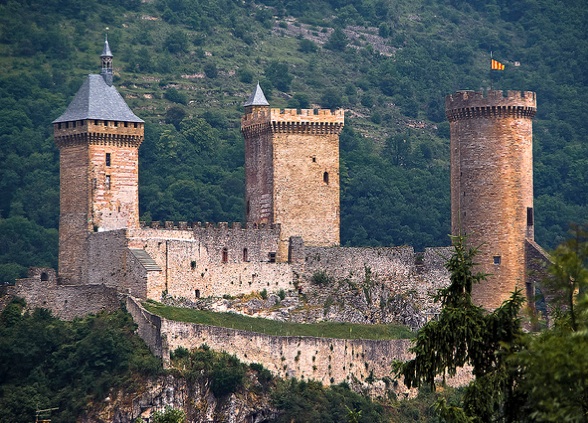Ximene has enjoyed a privileged upbringing. Not every aspect of the 14th century world impacts directly on her. However, as is often the case, privilege brings with it duty and responsibility. In her case it has also brings severe constraint as her guardian seeks to gain political advantage by conducting an auction, offering her hand in marriage to the highest bidder.
Ximene is trapped; incarcerated in a Château whose defences have never been breached, surrounded by deep valleys that are manned as intensively as conventional fortifications. Ximene’s prison is not entirely comprised of cold stone walls and a surrounding ring of mountains. As she considers her options she is desperately short of the information she needs to make sensible decisions. Her view of the world outside Foix,is a narrow view inevitably constricted by her limited experience, her Cathar faith and non stop indoctrination by her grandmother, about what her duties and responsibilities might and should be.
Ximene is totally committed to the Cathar faith. She has been brought up to believe that it is her destiny to restore the Cathar faith and to do that she needs to establish Occitan as an Independent state as a haven where the Cathar faith can be practiced without fear of prosecution.
Entwined with her faith is her inheritance, She is nominally the heiress to a large portion of Occitan. Occitan is a geographical area, a culture and a language. In 1209, a crusade was mobilised by the Pope to eradicate the Cathar faith. Because the lords of Occitan had consistently refused to persecute Cathars, the first target of the Crusade was to remove these Lords. Ximene’s family,the Trencavels, Viscomptes of Albi,Razes,Carcassonne and Beziers suffered more than any. During the subsequent war, lasting more than 35 years, several generations of Trencavels tried to reclaim their land but ultimately, drained of resources, they failed. Ximene is being asked to try again.
Eventually the Northern Franks claimed sovereignty over the Trencavel lands. This claim was ratified by the treaty of Corbeil, between the Franks and Aragonese in 1258. The Trencavels were totally dispossessed. However for a hundred years the rule of the Franks has been problematic. The lands of Occitan are too far from their homeland in the Isle de Paris for them to govern directly. The Franks have imported northerners, who do not even speak Occitan, in new towns called Bastides. Bastides are effectively fortified habitations, insulated from the general poulation. In this way the Franks hope to exert some form of control. More recently they have resorted to governance by mercenaries, bands of ex-soldiers known as “Les Routiers”. The mercenaries roam the countryside caring nothing for the general populace, only for their own short term advantage. They remove anything of value and use murder, rape and torture as a means to intimidate the population
In 1355 Occitan is in a ferment of rebellious talk, but it is only talk. They year for a leader who could turn talk into action,but for them also the concept of an independent occitan is inextricable linked to the cathar faith. Ximene knows that if she had been prepared to swear allegiance to the King of the Franks and marry his son Louis of Anjou she could well have regained the family lands, possibly in her own right. She believes however that this option would have required her to sanction the continued persecution of Cathars, something she was never prepared to do and which in any case would have made her rule unacceptable.
So, reluctantly and having no clear idea of how it might be made to work, Ximene comes to believe that she must create a new nation of Occitan, independent from the Franks.
Under the influence of her Grandmother she decides that the only way this can be achieved is by forming an alliance with the Plantagent rulers of England and Aquitaine. Aquitaine is one of the “Four Quarters” of Occitan, speaking the same language and sharing the same culture. The most obvious way to achieve this would be to marry into the Plantagenet family. The heir to the Plantagenet throne is Edward of Woodstock, the Black Prince. Ximene is told he is available and wishes to meet her. It is possible that with the Prince’s support all of Occitan could be united into a new nation with its own language its own natural borders and its own culture.
During the negotiations about the proposed marriage, Ximene discovers that one of the factors which has made her attractive to the Prince is that she is reputed to have inherited the Sangreal, the Holy Blood. Those who carry this blood are considered to have the right to rule and every Royal family is keen to add the Sangreal to their own bloodline. There are however dangers as well as benefits in possessing the Sangreal Those who fail in a bid to acquire the bloodline may also be prepared to kill in order to prevent others acquiring it.
